新概念第三册Lesson 23 One man's meat is another man's poison讲义
文档属性
| 名称 | 新概念第三册Lesson 23 One man's meat is another man's poison讲义 | 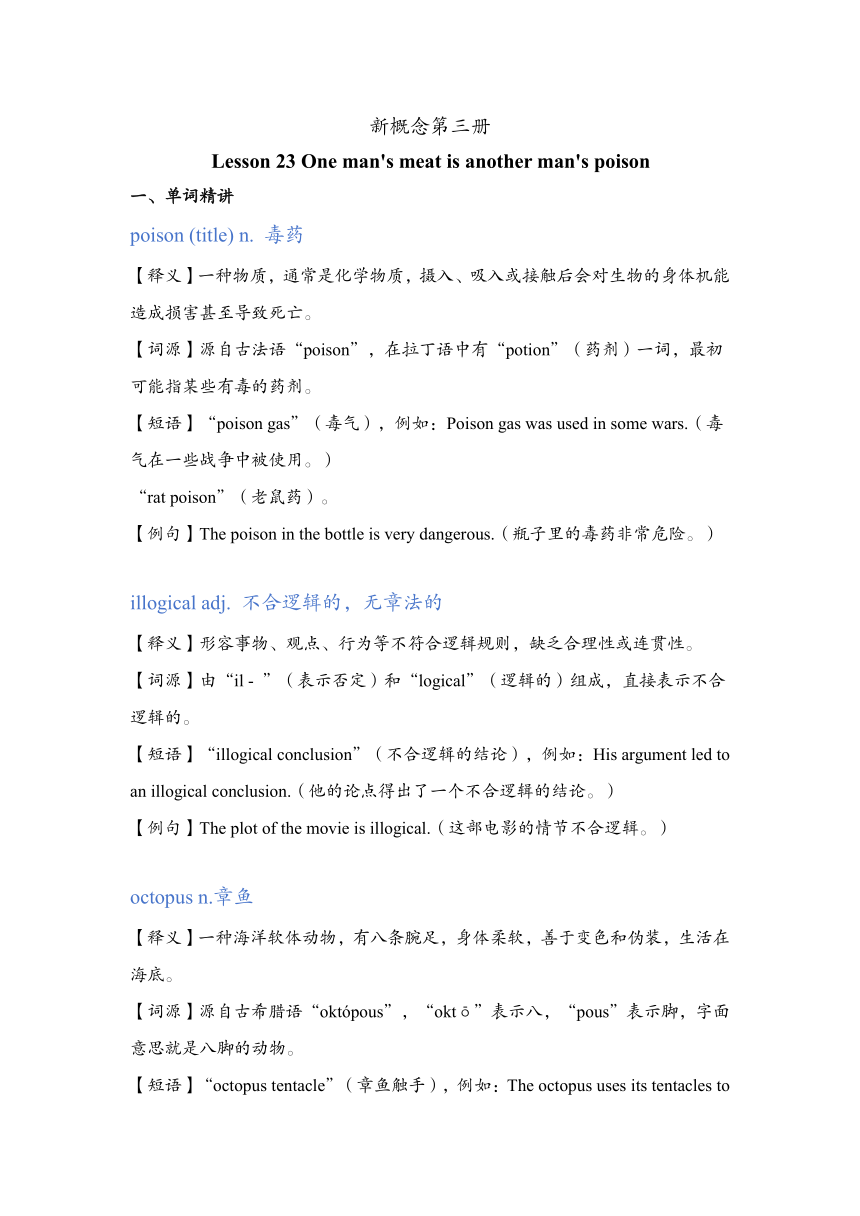 | |
| 格式 | docx | ||
| 文件大小 | 172.0KB | ||
| 资源类型 | 教案 | ||
| 版本资源 | 新概念英语 | ||
| 科目 | 英语 | ||
| 更新时间 | 2024-12-04 16:36:42 | ||
图片预览

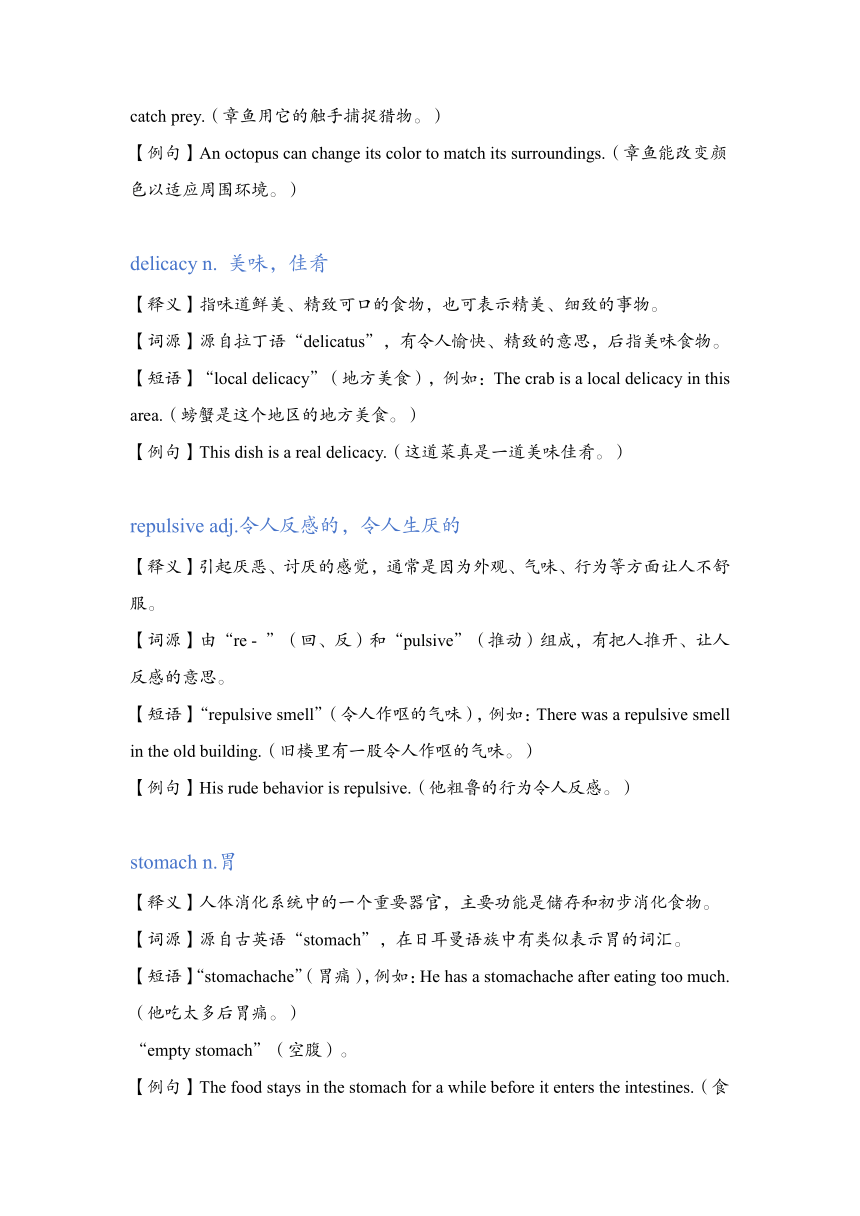
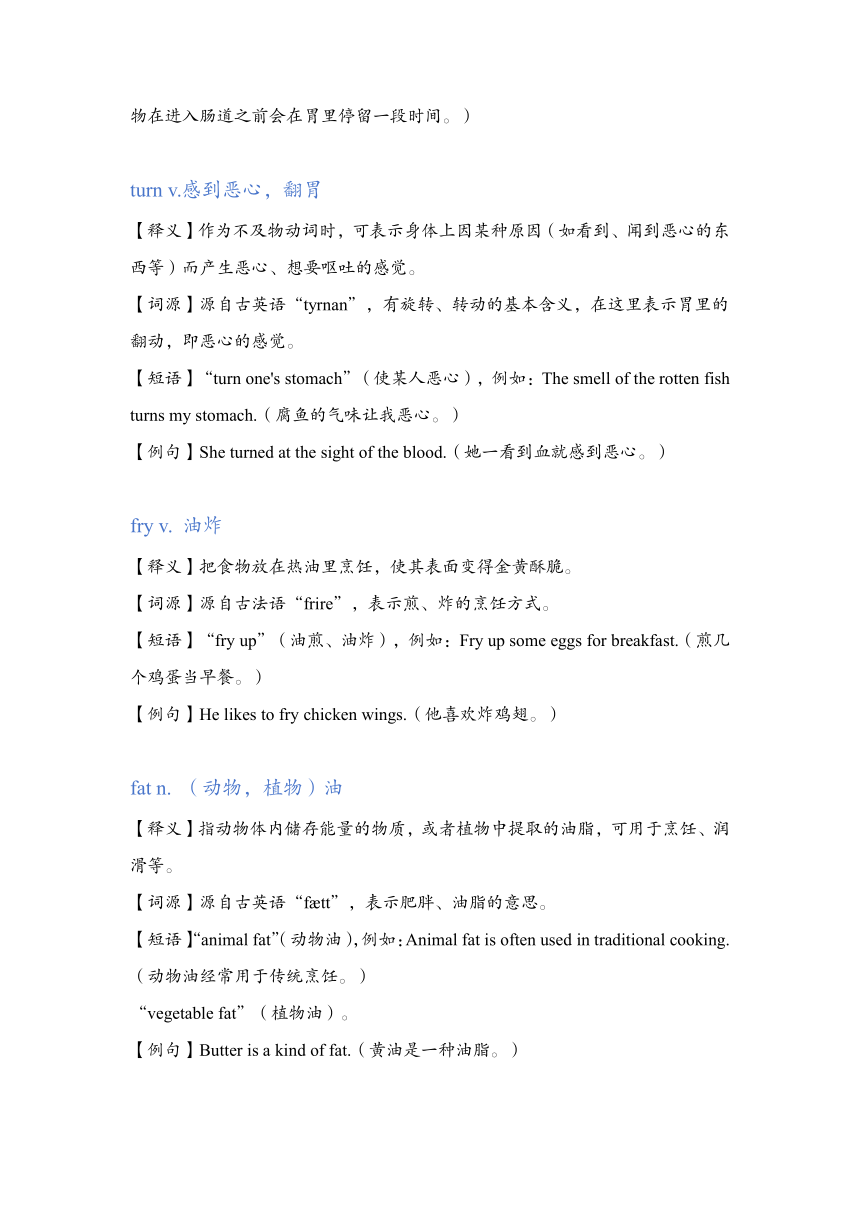
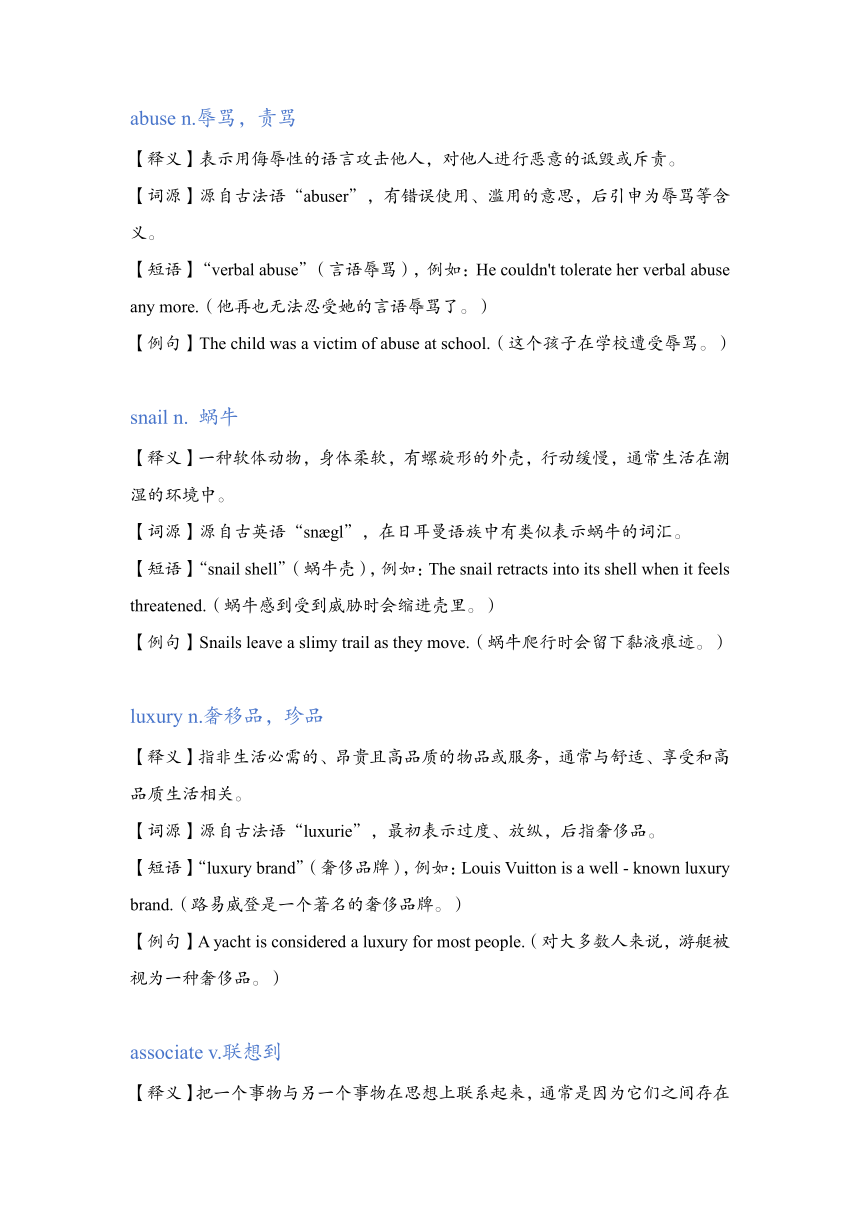
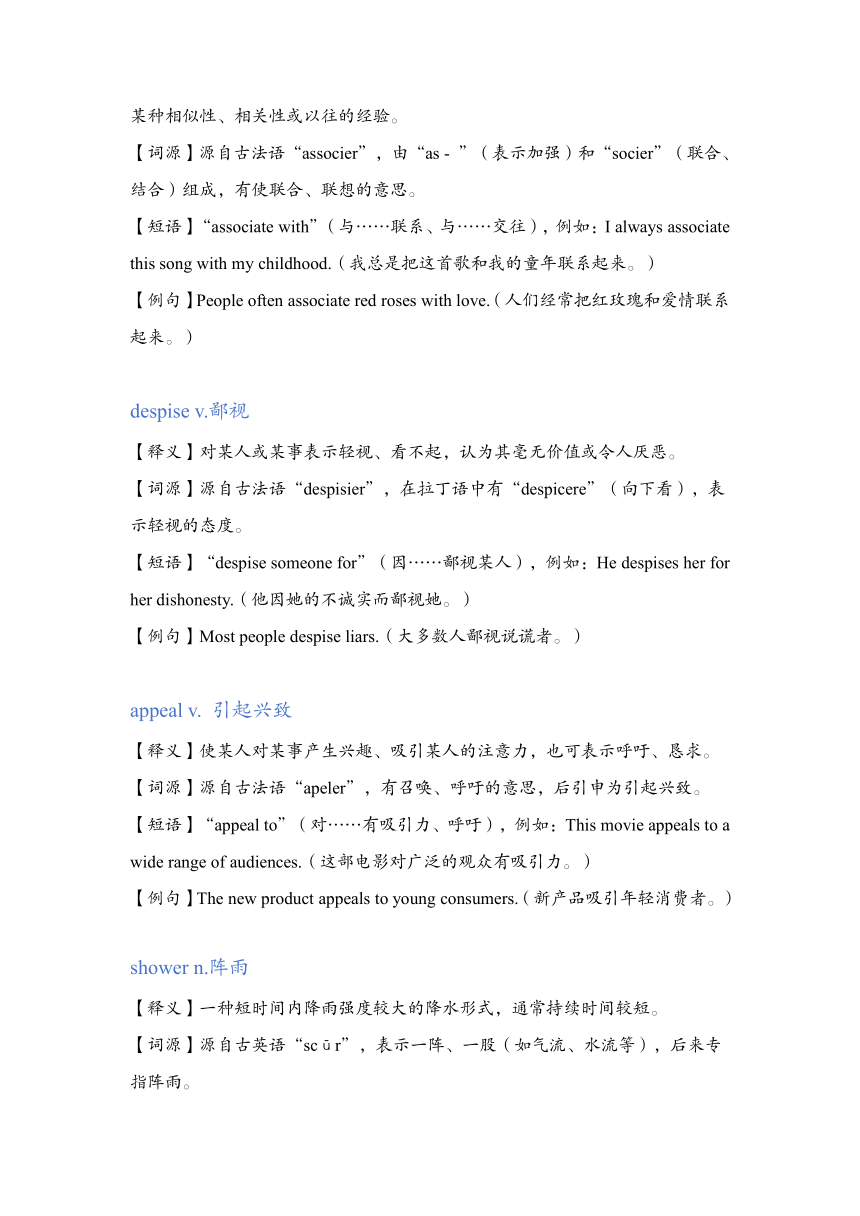
文档简介
新概念第三册
Lesson 23 One man's meat is another man's poison
单词精讲
poison (title) n. 毒药
【释义】一种物质,通常是化学物质,摄入、吸入或接触后会对生物的身体机能造成损害甚至导致死亡。
【词源】源自古法语“poison”,在拉丁语中有“potion”(药剂)一词,最初可能指某些有毒的药剂。
【短语】“poison gas”(毒气),例如:Poison gas was used in some wars.(毒气在一些战争中被使用。)
“rat poison”(老鼠药)。
【例句】The poison in the bottle is very dangerous.(瓶子里的毒药非常危险。)
illogical adj. 不合逻辑的,无章法的
【释义】形容事物、观点、行为等不符合逻辑规则,缺乏合理性或连贯性。
【词源】由“il - ”(表示否定)和“logical”(逻辑的)组成,直接表示不合逻辑的。
【短语】“illogical conclusion”(不合逻辑的结论),例如:His argument led to an illogical conclusion.(他的论点得出了一个不合逻辑的结论。)
【例句】The plot of the movie is illogical.(这部电影的情节不合逻辑。)
octopus n.章鱼
【释义】一种海洋软体动物,有八条腕足,身体柔软,善于变色和伪装,生活在海底。
【词源】源自古希腊语“októpous”,“oktō”表示八,“pous”表示脚,字面意思就是八脚的动物。
【短语】“octopus tentacle”(章鱼触手),例如:The octopus uses its tentacles to catch prey.(章鱼用它的触手捕捉猎物。)
【例句】An octopus can change its color to match its surroundings.(章鱼能改变颜色以适应周围环境。)
delicacy n. 美味,佳肴
【释义】指味道鲜美、精致可口的食物,也可表示精美、细致的事物。
【词源】源自拉丁语“delicatus”,有令人愉快、精致的意思,后指美味食物。
【短语】“local delicacy”(地方美食),例如:The crab is a local delicacy in this area.(螃蟹是这个地区的地方美食。)
【例句】This dish is a real delicacy.(这道菜真是一道美味佳肴。)
repulsive adj.令人反感的,令人生厌的
【释义】引起厌恶、讨厌的感觉,通常是因为外观、气味、行为等方面让人不舒服。
【词源】由“re - ”(回、反)和“pulsive”(推动)组成,有把人推开、让人反感的意思。
【短语】“repulsive smell”(令人作呕的气味),例如:There was a repulsive smell in the old building.(旧楼里有一股令人作呕的气味。)
【例句】His rude behavior is repulsive.(他粗鲁的行为令人反感。)
stomach n.胃
【释义】人体消化系统中的一个重要器官,主要功能是储存和初步消化食物。
【词源】源自古英语“stomach”,在日耳曼语族中有类似表示胃的词汇。
【短语】“stomachache”(胃痛),例如:He has a stomachache after eating too much.(他吃太多后胃痛。)
“empty stomach”(空腹)。
【例句】The food stays in the stomach for a while before it enters the intestines.(食物在进入肠道之前会在胃里停留一段时间。)
turn v.感到恶心,翻胃
【释义】作为不及物动词时,可表示身体上因某种原因(如看到、闻到恶心的东西等)而产生恶心、想要呕吐的感觉。
【词源】源自古英语“tyrnan”,有旋转、转动的基本含义,在这里表示胃里的翻动,即恶心的感觉。
【短语】“turn one's stomach”(使某人恶心),例如:The smell of the rotten fish turns my stomach.(腐鱼的气味让我恶心。)
【例句】She turned at the sight of the blood.(她一看到血就感到恶心。)
fry v. 油炸
【释义】把食物放在热油里烹饪,使其表面变得金黄酥脆。
【词源】源自古法语“frire”,表示煎、炸的烹饪方式。
【短语】“fry up”(油煎、油炸),例如:Fry up some eggs for breakfast.(煎几个鸡蛋当早餐。)
【例句】He likes to fry chicken wings.(他喜欢炸鸡翅。)
fat n. (动物,植物)油
【释义】指动物体内储存能量的物质,或者植物中提取的油脂,可用于烹饪、润滑等。
【词源】源自古英语“f tt”,表示肥胖、油脂的意思。
【短语】“animal fat”(动物油),例如:Animal fat is often used in traditional cooking.(动物油经常用于传统烹饪。)
“vegetable fat”(植物油)。
【例句】Butter is a kind of fat.(黄油是一种油脂。)
abuse n.辱骂,责骂
【释义】表示用侮辱性的语言攻击他人,对他人进行恶意的诋毁或斥责。
【词源】源自古法语“abuser”,有错误使用、滥用的意思,后引申为辱骂等含义。
【短语】“verbal abuse”(言语辱骂),例如:He couldn't tolerate her verbal abuse any more.(他再也无法忍受她的言语辱骂了。)
【例句】The child was a victim of abuse at school.(这个孩子在学校遭受辱骂。)
snail n. 蜗牛
【释义】一种软体动物,身体柔软,有螺旋形的外壳,行动缓慢,通常生活在潮湿的环境中。
【词源】源自古英语“sn gl”,在日耳曼语族中有类似表示蜗牛的词汇。
【短语】“snail shell”(蜗牛壳),例如:The snail retracts into its shell when it feels threatened.(蜗牛感到受到威胁时会缩进壳里。)
【例句】Snails leave a slimy trail as they move.(蜗牛爬行时会留下黏液痕迹。)
luxury n.奢移品,珍品
【释义】指非生活必需的、昂贵且高品质的物品或服务,通常与舒适、享受和高品质生活相关。
【词源】源自古法语“luxurie”,最初表示过度、放纵,后指奢侈品。
【短语】“luxury brand”(奢侈品牌),例如:Louis Vuitton is a well - known luxury brand.(路易威登是一个著名的奢侈品牌。)
【例句】A yacht is considered a luxury for most people.(对大多数人来说,游艇被视为一种奢侈品。)
associate v.联想到
【释义】把一个事物与另一个事物在思想上联系起来,通常是因为它们之间存在某种相似性、相关性或以往的经验。
【词源】源自古法语“associer”,由“as - ”(表示加强)和“socier”(联合、结合)组成,有使联合、联想的意思。
【短语】“associate with”(与……联系、与……交往),例如:I always associate this song with my childhood.(我总是把这首歌和我的童年联系起来。)
【例句】People often associate red roses with love.(人们经常把红玫瑰和爱情联系起来。)
despise v.鄙视
【释义】对某人或某事表示轻视、看不起,认为其毫无价值或令人厌恶。
【词源】源自古法语“despisier”,在拉丁语中有“despicere”(向下看),表示轻视的态度。
【短语】“despise someone for”(因……鄙视某人),例如:He despises her for her dishonesty.(他因她的不诚实而鄙视她。)
【例句】Most people despise liars.(大多数人鄙视说谎者。)
appeal v. 引起兴致
【释义】使某人对某事产生兴趣、吸引某人的注意力,也可表示呼吁、恳求。
【词源】源自古法语“apeler”,有召唤、呼吁的意思,后引申为引起兴致。
【短语】“appeal to”(对……有吸引力、呼吁),例如:This movie appeals to a wide range of audiences.(这部电影对广泛的观众有吸引力。)
【例句】The new product appeals to young consumers.(新产品吸引年轻消费者。)
shower n.阵雨
【释义】一种短时间内降雨强度较大的降水形式,通常持续时间较短。
【词源】源自古英语“scūr”,表示一阵、一股(如气流、水流等),后来专指阵雨。
【短语】“rain shower”(阵雨),例如:There will be a rain shower this afternoon.(今天下午将会有一场阵雨。)
【例句】We got caught in a shower on our way home.(我们在回家的路上遇到了一场阵雨。)
stroll n.溜达,散步
【释义】指悠闲、缓慢地步行,通常是为了放松或享受周围的环境。
【词源】源自古德语“strolchen”,有闲逛的意思。
【短语】“take a stroll”(散步),例如:Let's take a stroll in the park.(让我们在公园里散步吧。)
【例句】He likes to go for a stroll after dinner.(他喜欢饭后散步。)
impulse n.冲动
【释义】一种突然产生的、未经深思熟虑的想法或行动的倾向,往往是由情绪或本能驱动。
【词源】源自古拉丁语“impulsus”,有推动、驱使的意思,后指冲动。
【短语】“on impulse”(一时冲动),例如:He bought the car on impulse.(他一时冲动买了那辆车。)
【例句】Her impulse was to run away from the danger.(她的冲动是逃离危险。)
dozen n.12个,一打
【释义】表示数量为12个的一组物品。
【词源】源自古法语“douzaine”,在拉丁语中有“duodecim”(十二)一词。
【短语】“a dozen eggs”(一打鸡蛋),例如:I bought a dozen eggs at the supermarket.(我在超市买了一打鸡蛋。)
【例句】There are a dozen roses in the vase.(花瓶里有一打玫瑰。)
fancy v.喜爱,喜欢
【释义】表示对某人或某物有特殊的喜好或偏爱,常带有一种主观的、感性的情感。
【词源】源自古法语“fantaisie”,最初表示想象、幻想,后引申为喜爱。
【短语】“fancy doing something”(想要做某事),例如:I fancy going for a swim.(我想去游泳。)
【例句】She fancies that dress very much.(她非常喜欢那条裙子。)
二、课文精讲
1.On the other hand, your stomach would turn at the idea of frying potatoes in animal fat -- the normally accepted practice in many northern countries.另一方面,你一想到动物油炸土豆就会反胃,但这在北方许多国家却是一种普通的烹饪方法。
on the other hand 转折连接词,表示而另一方面
at the idea of: at 介词搭配作状语,表示当......就......;一......就......
at the idea of 一想到
at the sight of 一看到
at the mention of 一提到
at the news of 一听到......消息
at the touth of 一触摸到......东西
at the sound of 一听到......声音
at the thought of 一想到
Eg.: I was glad at the thought of getting something te eat.
I always love at the mention of ghost story.
practice 表示习俗,做法
habit表示个人习惯
custom社会的风俗或习俗
Eg.: Early to bed and early to rise is good habit.
It is now quite common practice for married women not to take their husband’s second name.
the custum of giving present at Christmas
2.The sad truth is that most of us have been brought up to eat certain foods and we stick to them all our lives.不无遗憾的是, 我们中的大部分人,生来就只吃某几种食品,而且一辈子都这样。
that引导表语从句,说明truth的内容
bring up抚养
Joe is born in England, but brought up in France.
She was brought up to beliee that money is the most (great) important thing in life.
stick to = keep to; not give up
Eg.: We stick to them all our lives.
I made my decision and I am going to stick to it.
stick to the idea
stick to the plan
insist on doing sth. 坚持做某事
persist in doing sth. 坚持做某事
3.No creature has received more praise and abuse than the common garden snail.没有一种生物所受到的赞美和厌恶会超过花园里常见的蜗牛了。
比较级表达最高级的概念
Nobody is more beautiflu than you.
He is more intelligent than anyone else in my class.
The common garden snail often receive more praise and abuse than other creatures.
4.There are countless people who, ever since their early years, have learned to associate snails with food.有不计其数的人们从小就知道蜗牛可做菜。
countless: 无数的,数不尽的 (=numerous)
who引导定语从句
associate sth. with sth. 把某物与某物相联系
5.I happened to be walking in my garden when I noticed a huge number of snails taking a stroll on some of my prize plants.我在花园里漫无目的地散步,突然注意到许许多多蜗牛在我的一些心爱的花木上慢悠悠地蠕动着。
happened to do 恰巧,碰巧
I happened to be out when he called.
We both happened to be travelling on the same plane.
happen / chance
It happened that I was out when he called.
It chanced that I was out when he called.
6.Acting on a sudden impulse, I collected several dozen, put them in a paper bag, and took them to Robert.我一时冲动,逮了几十只,装进一只纸袋里,带着去找罗伯特。
on a sudden impulse 一时的,冲动的
Acting on a sudden impulse, he went shopping to buy several dresses.
Robert was delighted to see me and equally pleased with my little gift. ==Robert was not only delighted to see me, but also pleased with my little gift.
7.I had forgotten all about the snails when Robert suddenly said that I must stay to dinner.我把蜗牛的事已忘得一干二净,罗伯特突然提出一定要我留下来吃晚饭,这才提醒了我。
when,表示正在这时突然,通常使用过去进行时,过去完成时等搭配;位于句中
He was having a bath when the telephine suddenly rang.
We had not ... like this when ... came in.
We were about to start when it rained.
Lesson 23 One man's meat is another man's poison
单词精讲
poison (title) n. 毒药
【释义】一种物质,通常是化学物质,摄入、吸入或接触后会对生物的身体机能造成损害甚至导致死亡。
【词源】源自古法语“poison”,在拉丁语中有“potion”(药剂)一词,最初可能指某些有毒的药剂。
【短语】“poison gas”(毒气),例如:Poison gas was used in some wars.(毒气在一些战争中被使用。)
“rat poison”(老鼠药)。
【例句】The poison in the bottle is very dangerous.(瓶子里的毒药非常危险。)
illogical adj. 不合逻辑的,无章法的
【释义】形容事物、观点、行为等不符合逻辑规则,缺乏合理性或连贯性。
【词源】由“il - ”(表示否定)和“logical”(逻辑的)组成,直接表示不合逻辑的。
【短语】“illogical conclusion”(不合逻辑的结论),例如:His argument led to an illogical conclusion.(他的论点得出了一个不合逻辑的结论。)
【例句】The plot of the movie is illogical.(这部电影的情节不合逻辑。)
octopus n.章鱼
【释义】一种海洋软体动物,有八条腕足,身体柔软,善于变色和伪装,生活在海底。
【词源】源自古希腊语“októpous”,“oktō”表示八,“pous”表示脚,字面意思就是八脚的动物。
【短语】“octopus tentacle”(章鱼触手),例如:The octopus uses its tentacles to catch prey.(章鱼用它的触手捕捉猎物。)
【例句】An octopus can change its color to match its surroundings.(章鱼能改变颜色以适应周围环境。)
delicacy n. 美味,佳肴
【释义】指味道鲜美、精致可口的食物,也可表示精美、细致的事物。
【词源】源自拉丁语“delicatus”,有令人愉快、精致的意思,后指美味食物。
【短语】“local delicacy”(地方美食),例如:The crab is a local delicacy in this area.(螃蟹是这个地区的地方美食。)
【例句】This dish is a real delicacy.(这道菜真是一道美味佳肴。)
repulsive adj.令人反感的,令人生厌的
【释义】引起厌恶、讨厌的感觉,通常是因为外观、气味、行为等方面让人不舒服。
【词源】由“re - ”(回、反)和“pulsive”(推动)组成,有把人推开、让人反感的意思。
【短语】“repulsive smell”(令人作呕的气味),例如:There was a repulsive smell in the old building.(旧楼里有一股令人作呕的气味。)
【例句】His rude behavior is repulsive.(他粗鲁的行为令人反感。)
stomach n.胃
【释义】人体消化系统中的一个重要器官,主要功能是储存和初步消化食物。
【词源】源自古英语“stomach”,在日耳曼语族中有类似表示胃的词汇。
【短语】“stomachache”(胃痛),例如:He has a stomachache after eating too much.(他吃太多后胃痛。)
“empty stomach”(空腹)。
【例句】The food stays in the stomach for a while before it enters the intestines.(食物在进入肠道之前会在胃里停留一段时间。)
turn v.感到恶心,翻胃
【释义】作为不及物动词时,可表示身体上因某种原因(如看到、闻到恶心的东西等)而产生恶心、想要呕吐的感觉。
【词源】源自古英语“tyrnan”,有旋转、转动的基本含义,在这里表示胃里的翻动,即恶心的感觉。
【短语】“turn one's stomach”(使某人恶心),例如:The smell of the rotten fish turns my stomach.(腐鱼的气味让我恶心。)
【例句】She turned at the sight of the blood.(她一看到血就感到恶心。)
fry v. 油炸
【释义】把食物放在热油里烹饪,使其表面变得金黄酥脆。
【词源】源自古法语“frire”,表示煎、炸的烹饪方式。
【短语】“fry up”(油煎、油炸),例如:Fry up some eggs for breakfast.(煎几个鸡蛋当早餐。)
【例句】He likes to fry chicken wings.(他喜欢炸鸡翅。)
fat n. (动物,植物)油
【释义】指动物体内储存能量的物质,或者植物中提取的油脂,可用于烹饪、润滑等。
【词源】源自古英语“f tt”,表示肥胖、油脂的意思。
【短语】“animal fat”(动物油),例如:Animal fat is often used in traditional cooking.(动物油经常用于传统烹饪。)
“vegetable fat”(植物油)。
【例句】Butter is a kind of fat.(黄油是一种油脂。)
abuse n.辱骂,责骂
【释义】表示用侮辱性的语言攻击他人,对他人进行恶意的诋毁或斥责。
【词源】源自古法语“abuser”,有错误使用、滥用的意思,后引申为辱骂等含义。
【短语】“verbal abuse”(言语辱骂),例如:He couldn't tolerate her verbal abuse any more.(他再也无法忍受她的言语辱骂了。)
【例句】The child was a victim of abuse at school.(这个孩子在学校遭受辱骂。)
snail n. 蜗牛
【释义】一种软体动物,身体柔软,有螺旋形的外壳,行动缓慢,通常生活在潮湿的环境中。
【词源】源自古英语“sn gl”,在日耳曼语族中有类似表示蜗牛的词汇。
【短语】“snail shell”(蜗牛壳),例如:The snail retracts into its shell when it feels threatened.(蜗牛感到受到威胁时会缩进壳里。)
【例句】Snails leave a slimy trail as they move.(蜗牛爬行时会留下黏液痕迹。)
luxury n.奢移品,珍品
【释义】指非生活必需的、昂贵且高品质的物品或服务,通常与舒适、享受和高品质生活相关。
【词源】源自古法语“luxurie”,最初表示过度、放纵,后指奢侈品。
【短语】“luxury brand”(奢侈品牌),例如:Louis Vuitton is a well - known luxury brand.(路易威登是一个著名的奢侈品牌。)
【例句】A yacht is considered a luxury for most people.(对大多数人来说,游艇被视为一种奢侈品。)
associate v.联想到
【释义】把一个事物与另一个事物在思想上联系起来,通常是因为它们之间存在某种相似性、相关性或以往的经验。
【词源】源自古法语“associer”,由“as - ”(表示加强)和“socier”(联合、结合)组成,有使联合、联想的意思。
【短语】“associate with”(与……联系、与……交往),例如:I always associate this song with my childhood.(我总是把这首歌和我的童年联系起来。)
【例句】People often associate red roses with love.(人们经常把红玫瑰和爱情联系起来。)
despise v.鄙视
【释义】对某人或某事表示轻视、看不起,认为其毫无价值或令人厌恶。
【词源】源自古法语“despisier”,在拉丁语中有“despicere”(向下看),表示轻视的态度。
【短语】“despise someone for”(因……鄙视某人),例如:He despises her for her dishonesty.(他因她的不诚实而鄙视她。)
【例句】Most people despise liars.(大多数人鄙视说谎者。)
appeal v. 引起兴致
【释义】使某人对某事产生兴趣、吸引某人的注意力,也可表示呼吁、恳求。
【词源】源自古法语“apeler”,有召唤、呼吁的意思,后引申为引起兴致。
【短语】“appeal to”(对……有吸引力、呼吁),例如:This movie appeals to a wide range of audiences.(这部电影对广泛的观众有吸引力。)
【例句】The new product appeals to young consumers.(新产品吸引年轻消费者。)
shower n.阵雨
【释义】一种短时间内降雨强度较大的降水形式,通常持续时间较短。
【词源】源自古英语“scūr”,表示一阵、一股(如气流、水流等),后来专指阵雨。
【短语】“rain shower”(阵雨),例如:There will be a rain shower this afternoon.(今天下午将会有一场阵雨。)
【例句】We got caught in a shower on our way home.(我们在回家的路上遇到了一场阵雨。)
stroll n.溜达,散步
【释义】指悠闲、缓慢地步行,通常是为了放松或享受周围的环境。
【词源】源自古德语“strolchen”,有闲逛的意思。
【短语】“take a stroll”(散步),例如:Let's take a stroll in the park.(让我们在公园里散步吧。)
【例句】He likes to go for a stroll after dinner.(他喜欢饭后散步。)
impulse n.冲动
【释义】一种突然产生的、未经深思熟虑的想法或行动的倾向,往往是由情绪或本能驱动。
【词源】源自古拉丁语“impulsus”,有推动、驱使的意思,后指冲动。
【短语】“on impulse”(一时冲动),例如:He bought the car on impulse.(他一时冲动买了那辆车。)
【例句】Her impulse was to run away from the danger.(她的冲动是逃离危险。)
dozen n.12个,一打
【释义】表示数量为12个的一组物品。
【词源】源自古法语“douzaine”,在拉丁语中有“duodecim”(十二)一词。
【短语】“a dozen eggs”(一打鸡蛋),例如:I bought a dozen eggs at the supermarket.(我在超市买了一打鸡蛋。)
【例句】There are a dozen roses in the vase.(花瓶里有一打玫瑰。)
fancy v.喜爱,喜欢
【释义】表示对某人或某物有特殊的喜好或偏爱,常带有一种主观的、感性的情感。
【词源】源自古法语“fantaisie”,最初表示想象、幻想,后引申为喜爱。
【短语】“fancy doing something”(想要做某事),例如:I fancy going for a swim.(我想去游泳。)
【例句】She fancies that dress very much.(她非常喜欢那条裙子。)
二、课文精讲
1.On the other hand, your stomach would turn at the idea of frying potatoes in animal fat -- the normally accepted practice in many northern countries.另一方面,你一想到动物油炸土豆就会反胃,但这在北方许多国家却是一种普通的烹饪方法。
on the other hand 转折连接词,表示而另一方面
at the idea of: at 介词搭配作状语,表示当......就......;一......就......
at the idea of 一想到
at the sight of 一看到
at the mention of 一提到
at the news of 一听到......消息
at the touth of 一触摸到......东西
at the sound of 一听到......声音
at the thought of 一想到
Eg.: I was glad at the thought of getting something te eat.
I always love at the mention of ghost story.
practice 表示习俗,做法
habit表示个人习惯
custom社会的风俗或习俗
Eg.: Early to bed and early to rise is good habit.
It is now quite common practice for married women not to take their husband’s second name.
the custum of giving present at Christmas
2.The sad truth is that most of us have been brought up to eat certain foods and we stick to them all our lives.不无遗憾的是, 我们中的大部分人,生来就只吃某几种食品,而且一辈子都这样。
that引导表语从句,说明truth的内容
bring up抚养
Joe is born in England, but brought up in France.
She was brought up to beliee that money is the most (great) important thing in life.
stick to = keep to; not give up
Eg.: We stick to them all our lives.
I made my decision and I am going to stick to it.
stick to the idea
stick to the plan
insist on doing sth. 坚持做某事
persist in doing sth. 坚持做某事
3.No creature has received more praise and abuse than the common garden snail.没有一种生物所受到的赞美和厌恶会超过花园里常见的蜗牛了。
比较级表达最高级的概念
Nobody is more beautiflu than you.
He is more intelligent than anyone else in my class.
The common garden snail often receive more praise and abuse than other creatures.
4.There are countless people who, ever since their early years, have learned to associate snails with food.有不计其数的人们从小就知道蜗牛可做菜。
countless: 无数的,数不尽的 (=numerous)
who引导定语从句
associate sth. with sth. 把某物与某物相联系
5.I happened to be walking in my garden when I noticed a huge number of snails taking a stroll on some of my prize plants.我在花园里漫无目的地散步,突然注意到许许多多蜗牛在我的一些心爱的花木上慢悠悠地蠕动着。
happened to do 恰巧,碰巧
I happened to be out when he called.
We both happened to be travelling on the same plane.
happen / chance
It happened that I was out when he called.
It chanced that I was out when he called.
6.Acting on a sudden impulse, I collected several dozen, put them in a paper bag, and took them to Robert.我一时冲动,逮了几十只,装进一只纸袋里,带着去找罗伯特。
on a sudden impulse 一时的,冲动的
Acting on a sudden impulse, he went shopping to buy several dresses.
Robert was delighted to see me and equally pleased with my little gift. ==Robert was not only delighted to see me, but also pleased with my little gift.
7.I had forgotten all about the snails when Robert suddenly said that I must stay to dinner.我把蜗牛的事已忘得一干二净,罗伯特突然提出一定要我留下来吃晚饭,这才提醒了我。
when,表示正在这时突然,通常使用过去进行时,过去完成时等搭配;位于句中
He was having a bath when the telephine suddenly rang.
We had not ... like this when ... came in.
We were about to start when it rained.
同课章节目录
